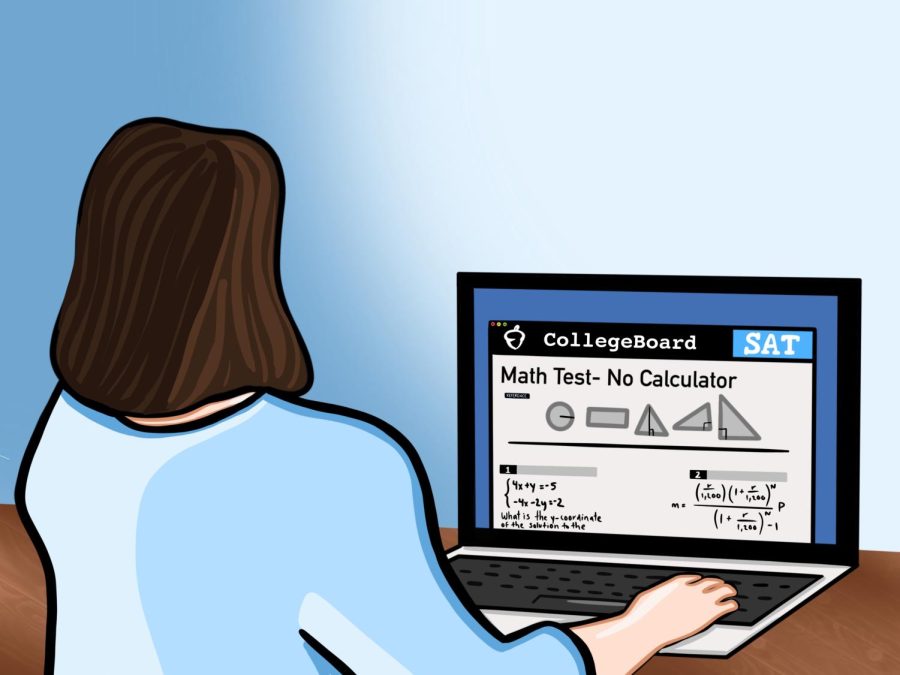College Board announces SAT changes
Illustration by Alexa Druyanoff
With the College Board’s recent announcement regarding the SAT, students reflect on how these changes may affect them on the road to college.
February 1, 2022
The College Board’s SAT will be digitized and shortened to two hours starting in the Spring of 2024. In addition to the two main format changes, reading passages will be shorter and also reflect a wider range of subject material and calculators will be allowed for both math sections.
While many colleges and universities have already eliminated the standardized testing requirement in the application process, the updated SAT will still be available for students. According to The College Post, two-thirds of United States (US) colleges have gone optional in 2022.
Between 2020 and 2021, the number of high school students who took the SAT decreased from 2.2 million to 1.5 million, according to the New York Times. In the class of 2022, about 1.7 million students have taken the test so far.
Dean Department Head Chris Jones said the Upper School Deans collectively agree that standardized tests are intended to serve as a predictor of academic success at the collegiate level. He said standardized tests also provide a standardized measure because the strength of nationwide high school academic programs can be difficult to determine, as grading systems and inflation differ between institutions.
“The stress attached to standardized testing isn’t insignificant, and the SAT’s attempt to appeal to a generation of digital natives could serve as a way to lessen some of the related stress and anxiety,” Jones said. “It feels like the SAT and other standardized tests are being phased out of admission processes altogether, so these changes seem more an attempt to stay relevant in a world where such metrics and their validity are being questioned widely.”
Jones said the equity of SAT questions has raised concerns, and now the digitization of the test may create limited access for students.
“It’s hard to see the changes addressing the dominant question of the day regarding standardized tests: fairness,” Jones said. “The modality of standardized tests hasn’t been questioned as much as the questions being asked, how those are determined and what they’re assumed to measure. In addition, the SAT changes will rely on access to computers [and] technology, and that’s a huge assumption that could limit access for certain college-hopeful students.”
Jones said the changes could ultimately backfire for the College Board because colleges may see this SAT change final reason to go test-optional.
“The changes could be a big swing that actually works against them,” Jones said. “For colleges who feel they haven’t been negatively impacted, or conversely, have been helped dramatically, by test-optional policies, it could be easier for them to hop off the standardized-testing train with the first administration of the new SAT serving as their office’s deadline to make a final decision on the matter.”
Kai Do ’24 said she is unsure how these changes to the SAT will make the test fairer, but she does feel more relaxed. She said she is curious to observe the future of the SAT.
“I’m not a great test taker so I don’t think that standardized tests actually reflect my abilities, and I know a lot of other people that have this same problem,” Do said. “The changes might be good. [The shortened test may not] stress people out too much and they can stay [more] focused, but the online part is a bit tricky.”
Upper School Dean Adam Howard said he thinks the idea of taking the SAT on a computer, even though it will be proctored, sounds much more manageable and less daunting to students but thinks standardized testing will ultimately fade away.
“Standardized testing is a sinking ship, but these are companies that are trying to stay afloat,” Howard said. “It’s really hard for schools that have gone test-optional to go backward to require testing. I think we are going into a time where the testing will ultimately go away or it’s going to remain optional.”
Howard said another reason the SAT may have made these changes is to compete with the ACT.
“There’s a great chess match between the SAT and the ACT in trying to win the standardized test wars,” Howard said. “This is just the latest move by the College Board trying to draw kids their way.”
Howard thinks standardized tests will increasingly become less significant in the college process.
“If I were the College Board, I [would] think it was a good move as far as what they are trying to accomplish with their goals,” Howard said. “As a [college] counselor and as someone who is generally not a fan of standardized testing, I don’t think it’s going to move the needle in the way that they are hoping it will.”































